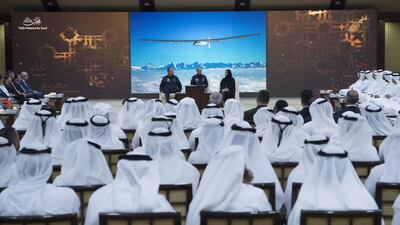ABU DHABI // To conquer the impossible, one must explore the unknown, according to the pilots behind the historic mission to fly a solar-powered plane around the world.
Bertrand Piccard and Andre Borschberg finished the final leg of the Solar Impulse 2 flight in July last year, after travelling 40,000 kilometres without fossil fuel to promote the use of renewable energy.
The project started and ended in Abu Dhabi, was 18 years in the making and encountered many obstacles, the Swiss pilots said on Monday.
They were speaking at the Ramadan majlis of Sheikh Mohammed bin Zayed, Crown Prince of Abu Dhabi and Deputy Supreme Commander of the Armed Forces.
The Crown Prince was one of few people who believed in the project after hearing about the idea, and told the pilots they had his support.
"When people ask us, 'Why Abu Dhabi?' I tell them, yes, Abu Dhabi is an oil producer, but it is also diversifying into renewable alternative energy," said Dr Piccard, co-founder of the Solar Impulse 2 project.
“The biggest hurdle comes from everywhere if you want to do something that has never been done before. When you come with an ambitious project that has never been done before, you get one yes and 99 nos. And this is exhausting because, in the end, you don’t know if you are right or wrong. So many people tell you it is impossible, but impossible is in the head of the people, not reality.”
The idea was born in 1999 when Dr Piccard’s first circumnavigation of the globe in a hot-air balloon landed in Egypt with empty fuel tanks. He then vowed to fly around the world again without worrying about fuel reserves.
“For a long time, the environment was advertised as something boring, expensive, difficult, but no, it’s not true,” Dr Piccard said. “We have proved that none of this is true.”
The Solar Impulse project was founded to show a new form of technology.
“How can renewable energies achieve goals that are considered to be impossible?” Dr Piccard said. “How can we inspire governments to be cleaner and more profitable?”
These must be achieved through cooperation despite differences and finding a new understanding of the world, he said.
“Andre is a jet fighter pilot and I am a balloonist, and I am a doctor and he is an engineer, so we cannot be more different,” Dr Piccard said.
“So when I came with my own world vision and he his own, none of us could do it, but when we allowed ourself to see the other, he changed my way and I changed his way of thinking.
“You cannot continue to be creative in your comfort zone.”
The pilots worked together towards their vision and took risks to make it happen. During the flight from Japan to Hawaii, the first flight over the ocean, some of the plane’s equipment did not work and the team’s engineers told Mr Borschberg that he had to return to Japan to have it fixed.
“But we were waiting for two months for the weather window to open,” Mr Borschberg said.
“Imagine day after day you look at the weather and you say ‘No, not today,’ and for the first time the weather window was open, and we thought it not possible to miss this window.”
Mr Borschberg decided to continue the flight despite the warning from engineers.
“So we had two worlds, safety and procedures and the world of pioneers,” he said. “So you need sometimes to know where to take the step that is going to bring you to the other side.”
hdajani@thenational.ae


